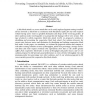429 search results - page 12 / 86 » Group Routing without Group Routing Tables |
ICNP
1998
IEEE
13 years 11 months ago
1998
IEEE
In Internet multicast, the set of receivers can be dynamic with receivers joining and leaving a group asynchronously and without the knowledge of the sources. The Internet today u...
MOBICOM
2004
ACM
14 years 4 days ago
2004
ACM
Realistic models for node movement are essential in simulating mobile ad hoc networks. Many MANET scenarios are most realistically represented using group movement, but existing g...
KDD
2008
ACM
14 years 7 months ago
2008
ACM
IT problem management calls for quick identification of resolvers to reported problems. The efficiency of this process highly depends on ticket routing--transferring problem ticke...
GLOBECOM
2007
IEEE
14 years 1 months ago
2007
IEEE
— An opportunistic large array (OLA) is a form of cooperative diversity in which a large group of simple, inexpensive relays or forwarding nodes operate without any mutual coordi...
FGCN
2007
IEEE
13 years 8 months ago
2007
IEEE
A black hole attack is a severe attack that can be easily employed against routing in mobile ad hoc networks. A black hole is a malicious node that falsely replies for any route r...

